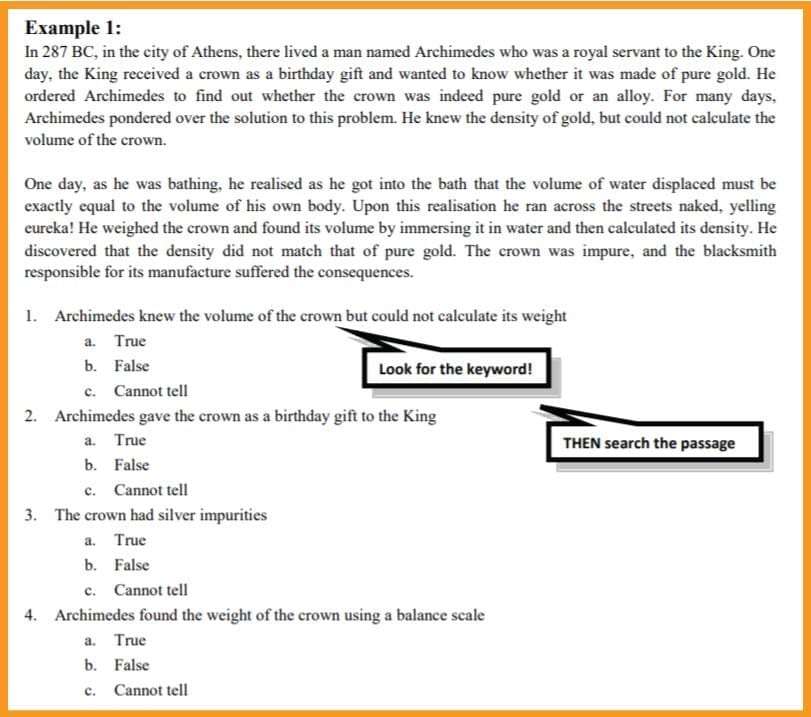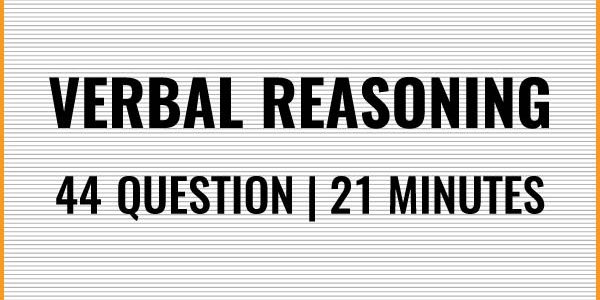UCAT Verbal Reasoning: The Expert Tutors’ Guide
44 questions | 21 minutes
The UCAT Verbal Reasoning section is similar to a comprehension test.
The UCAT verbal reasoning section aims to assess the accuracy and speed of reading – important traits for a doctor. You need to able to find information that is relevant, then analyse statements related to the passage. You have just under 30 seconds to answer each question. As with all sections you have one minute to read the instructions.
Let’s get into it!
Usually, there are 11 separate pasages, each with 4 questions about it.
As mentioned, you have 30 seconds to answer each question in the UCAT verbal reasoning subtest. Build this into the time you have to also read and understand the question, that’s not much time.
You will be presented with a passage, then questions which relate to the passage. The passage will look a little something like this (answers at the end here, see how you do!):

There are two types of questions that you will face. Each requires a slightly different approach, here they are;
True/False/Cannot Tell
When to pick True: You should pick True if a statement either matches the passage or can be directly inferred from it.
When to pick False: Choose this is the statement either contradicts the passage or exaggerates a claim the passage makes to an extent that it becomes untrue.
When to pick Cannot Tell: Cannot Tell is usually the most difficult option to pick. You must remember you’re answering only on the passage, not based on any of your own knowledge! You should choose Cannot Tell when there isn’t enough information to make up your mind either way. Try to use this option actively – it isn’t something to conclude too quickly. If you find yourself actively looking for information to select True or False, then the answer is probably Cannot Tell.
Select the most appropriate response
We say the most appropriate because more than one answer can seem appropriate, so you need to pick best response, because only one answer is correct. As with the rest of the UCAT there is no negative marking, so if you are unsure of the best response you can make an educated guess.
Our Top Verbal Reasoning Tips
1. Extreme words
No we don’t mean verbs that have been snowboarding. We mean words like “Extremely“, “Always” and “Never“. These words stand to make bold claims, which often can make them untrue. You need to be able to find direct contradiction to mark them as false however. Keep a lookout for words that are the “be all and end all”.
2. Prioritise
You can flag and come back to any questions that are taking a lot of time or thought. By flagging for review, you make this easier. Since time is of the essence, you don’t want to waste time mulling over a long passage when you could be scoring easy marks elsewhere. Finish all the easy questions first then return to harder ones if time allows. If you are running low on time, make sure to make educated guesses since there’s a good chance you pick up the mark anyway.
3. Be a lawyer
Carefully analyse the statements like you’re in a court room. Look for the evidence! Examine the passage closely, find evidence that either supports or disproves the statement. You’re making decisions based only upon the information in the passage. If there isn’t enough information to decide, then don’t be afraid to say Cannot Tell.
4. Read the question first
Always read the question before the passage. This allows you to look out for key bits of information required to answer the question. You simply don’t have enough time to read all the passages thoroughly.
The Answer – How did you fare?











